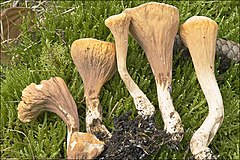| Clavariadelphus truncatus | |
|---|---|

| |
| Scientific classification | |
| Kingdom: | Fungi |
| Division: | Basidiomycota |
| Class: | Agaricomycetes |
| Subclass: | Agaricomycetidae |
| Order: | Gomphales |
| Family: | Gomphaceae |
| Genus: | Clavariadelphus |
| Species: | C. truncatus |
| Binomial name | |
| Clavariadelphus truncatus (Quél.) Donk | |
| Synonyms | |
|
Clavariadelphus borealis V.L. Wells & Kempton | |
| Clavariadelphus truncatus | |
|---|---|
| Smooth hymenium | |
| No distinct cap | |
| Hymenium attachment is irregular or not applicable | |
| Stipe is bare | |
| Spore print is ochre | |
| Ecology is mycorrhizal | |
| Edibility is edible or choice | |
Clavariadelphus truncatus, commonly known as the truncate club coral, truncated club, or club coral, is a species of mushroom. It is a member of the basidiomycete fungi family Gomphaceae.
Description
The species has a yellow-orange fruiting body in the shape of a club with a flat cap. The flesh is white, thin, and hollow at the top. The vertical side of the fruiting body normally has folds and wrinkles, but can be smooth. The spores are smooth and their spore print is pale yellow to ochre.
The mushroom has a pleasant odor and a sweet taste.
Chemistry
C. truncatus can bioaccumulate significant amounts of zinc, and radioactive caesium-137.
Similar species
Although one field guide says that it is unlikely that anyone would confuse the mushroom with another species, the yellow chanterelle is distantly related to the mushroom and looks nearly the same, except for the ridges and cross-veined hymenium. In North America, Clavariadelphus pallidoincarnatus (found in the West) and C. unicolor (in the East) are similar, as is C. ligula. Clavariadelphus pistillaris is also similar, but the top is not flat. Additionally, Macrotyphula fistulosa is tall and skinny, and Neolecta has a bright yellow head.
Habitat and distribution
The mushroom's habitat is in coniferous forests from summer to autumn. The mushroom is a common species. The species is found at a high elevation and is widely distributed.
Uses
The mushroom is edible and has a sweet taste. Old mushrooms may be spongy and soft inside. The species is high in nutrition and can be used for cooking. One field guide says that the mushroom is one of the best to eat and has a sweet flavor that is especially appealing to some people. David Arora writes that the mushroom can be sauteed and served for dessert.
Medicine
The mushroom contains clavaric acid, which has been shown to reduce the rate of tumor development when given to mice. Clavaric acid interferes with farnesyltransferase, an enzyme implicated in tumorigenesis, which suggests that clavaric acid may have therapeutic value in the treatment of certain cancers. It has been reported that the mushrooms have significant antioxidant activity.
See also
References
- ^ Arora, David (1986). Mushrooms Demystified: A Comprehensive Guide to the Fleshy Fungi. Ten Speed Press. p. 634. ISBN 978-0-89815-169-5.
Clavariadelphus truncatus.
- "Clavariadelphus truncatus · truncated club". The British Mycological Society. Archived from the original on 2022-02-05. Retrieved 2021-05-21.
- "Clavariadelphus truncatus · truncated club". EOL. Retrieved 2021-05-21.
- "Clavariadelphus truncatus · truncated club". NBN Atlas. Retrieved 2021-05-21.
- "Truncated Club (Clavariadelphus truncatus)". Ninaturalist.nz. Retrieved 2021-05-21.
- "Clavariadelphus truncatus (Quél.) Donk – Truncate Club Coral, Truncated Pestle". botany.cz. Retrieved 2021-05-21.
- ^ Trudell, Steve; Ammirati, Joe (2009). Mushrooms of the Pacific Northwest. Timber Press Field Guides. Portland, OR: Timber Press. p. 239. ISBN 978-0-88192-935-5.
- ^ Miller Jr., Orson K.; Miller, Hope H. (2006). North American Mushrooms: A Field Guide to Edible and Inedible Fungi. Guilford, CN: FalconGuide. p. 343. ISBN 978-0-7627-3109-1.
- C. Roody, William (2003). Mushrooms of West Virginia and the Central Appalachians. Kentucky: University Press of Kentucky. p. 408. ISBN 978-0-8131-9039-6.
- Gonen, TF; Yamac M, Cabuk A, Yildiz Z, M; Cabuk, A; Yildiz, Z (2008). "Selection of newly isolated mushroom strains for tolerance and biosorption of zinc in vitro". Journal of Microbiology and Biotechnology. 18 (3): 483–489. PMID 18388466.
{{cite journal}}: CS1 maint: multiple names: authors list (link) - Gaso, MI; Segovia N, Morton O, Lopez JL, Machuca A, Hernandez E, N; Morton, O; Lopez, JL; Machuca, A; Hernandez, E (2007). "Radioactive and stable metal bioaccumulation, crystalline compound and siderophore detection in Clavariadelphus truncatus". Journal of Environmental Radioactivity. 97 (1): 57–69. Bibcode:2007JEnvR..97...57G. doi:10.1016/j.jenvrad.2007.03.003. PMID 17466420.
{{cite journal}}: CS1 maint: multiple names: authors list (link) - Authors, Multiple (1992). Edible Wild Mushrooms of North America: A Field-To-Kitchen Guide. Texas: University of Texas Press. p. 114. ISBN 978-0-292-72080-0.
- "Clavariadelphus truncatus". California Fungi. Retrieved 2010-01-17.
- ^ Audubon (2023). Mushrooms of North America. Knopf. p. 123. ISBN 978-0-593-31998-7.
- "Clavariadelphus truncatus". University of Guelph. Retrieved 2010-01-17.
- Stucky Evenson, Vera (1997). Mushrooms of Colorado and the Southern Rocky Mountains. Big Earth Publishing. p. 165. ISBN 978-1-56579-192-3.
- Smith, Alexander Hanchett; Weber, Nancy S. (1980). The mushroom hunter's field guide. Michigan: University of Michigan Press. p. 79. ISBN 978-0-472-85610-7.
- Persson, Olle (1998). The chanterelle book. Ten Speed Press. p. 78. ISBN 978-0-89815-947-9.
- McKnight; McKnight (1998). A Field Guide to Mushrooms: North America. Houghton Mifflin Harcourt. p. 72. ISBN 978-0-395-91090-0.
- ^ Jayasuriya, Hiranthi; Silverman, Keith C.; Zink, Deborah L.; Jenkins, Rosalind G.; Sanchez, Manuel; Pelaez, Fernando; Vilella, Dolores; Lingham, Russell B.; Singh, Sheo B. (1998). "Note Clavaric Acid: A Triterpenoid Inhibitor of Farnesyl-Protein Transferase from Clavariadelphus truncatus". Journal of Natural Products. 61 (12): 1568–1570. doi:10.1021/np980200c. PMID 9868169.
- Sevi̇ndi̇k, Mustafa (2018-10-25). "Investigation of Oxidant and Antioxidant Status of Edible Mushroom Clavariadelphus truncatus". Mantar Dergisi. 9 (2): 165–168. doi:10.30708/mantar.427457 (inactive 1 November 2024).
{{cite journal}}: CS1 maint: DOI inactive as of November 2024 (link)
External links
- Healing-mushrooms.net Image & description of bioactive properties
| Taxon identifiers | |
|---|---|
| Clavariadelphus truncatus |
|